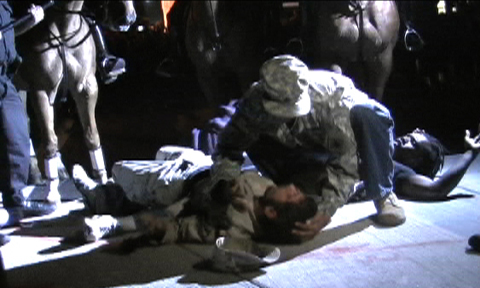
It’s noon on a Sunday when your phone rings: “Hi it’s Lisa calling from the Obama Headquarters. Would you be willing to travel to a battleground state to canvass?” Just having woken up, you groggily answer, “Sorry, I have a job.”
This is the way most of Lisa Nonken’s time at the Headquarters is spent. Since moving from New England to Chicago to attend the MFA sculpture program at SAIC, Nonken has spent many a Sunday afternoon volunteering at the Obama Headquarters, which was recently relocated to the basement of a nondescript office building in the West Loop. At the Headquarters, she calls about 25-50 registered Democrats to ask if they’d like to join on day trips to nearby battleground states like Missouri, Indiana, and Ohio. The occasional enthusiastic ‘yes’ makes the whole effort worth it.
Having been involved with activist groups as an undergrad at Mt. Holyoke College in Massachusetts, Nonken felt the need to step up and organize a student activist group at SAIC, a campus that lacked any sort of political fliers or noticeable interest in the election prior to the fall semester.
“Trying to form the group was awkward in that, as a new student, I needed another student to sign on as a co-leader, a faculty member signed as an advisor, then I needed to have a list of students signed up as being in the group,” said Nonken, who relied on word of mouth to publicize the group. “It was kind of a Catch 22 because I couldn’t put up any posters because only official student groups can do it. Not only that, but I wasn’t able to do campus wide announcements, like ‘if you’re interested get in touch,’ because I wasn’t an official student group yet.”
Nonken’s solution was to create “free speech zones” both on campus bulletin boards and on the portal, in which students would be able to freely post announcements without approval from the administration. “I think it will give people more freedom and encourage them to voice their opinions, because if what you’re saying has a strong political content, they’re nervous about the school itself putting a seal of approval on it, and it doesn’t have to be that way.”
Though Nonken’s idea of creating “free speech zones” has yet to be realized, Nonken suggested, “If you see a posting online or something that you totally don’t agree with, that’s great, I mean, for me, it’s like, ‘hey I didn’t know there were people out there that thought that! I think I need to voice my opinion on this.’ And that’s what its all about.”
One issue Nonken felt she needed to voice her opinion on was the issue of supporting a Presidential Candidate via Student Activists. Prior to October 2008, SAIC Campus Activities had never been propositioned by a student group who wanted to publicly support a specific presidential candidate. Campus Activities compromised that student groups could support a political party rather than a candidate. Their reason for this policy was that because student groups are partially funded by the school, fliers photocopied on the school’s dime “might imply that somehow the school is financially supporting a specific candidate, and that would threaten their nonprofit tax status for the IRS records, because they’re supposed to be a neutral education institution,” explained Nonken.
Still, Nonken was unsatisfied. Her main issue with this policy was that she felt deceptive, trying to build support for Barack Obama’s candidacy without being able to say so. Numerous letters, emails, and meetings later, Nonken convinced Campus Activities to further change their policy so that the Student Activists could endorse Senator Obama through posters, emails, and any other means that they deemed necessary.
“There are a lot of students in support of Obama’s candidacy, even if they don’t want to sign on for the Democratic Party as a whole. So having a more open focus for the group made a lot of sense, but we are now able to officially, openly endorse a specific candidate, which is just wonderful,” said Nonken, who commented that Campus Activites “has been as supportive as they can be, but not able to take the initiative. The initiative needs to come from the students, because they don’t want it to be seen as the school wants to organize this political group.”
“Of course, after the election, the Student Activists will be focusing on other local issues,” said Nonken, “Obviously everyone here is really busy, but compared to other schools, there are lots of opportunities here for students to become more engaged in politics, or whatever [they want to be involved in]. I’d like to see more discussions about the students and also just thinking about the world outside our school and how we’re a part of that and how we can become more active participants in that.”
The Student Activists are currently signing up volunteers to canvass in the State of Indiana during election weekend. The Student Activists also organized the Economic Crisis and You panel discussion with President Reiter on October 28, 2008.






